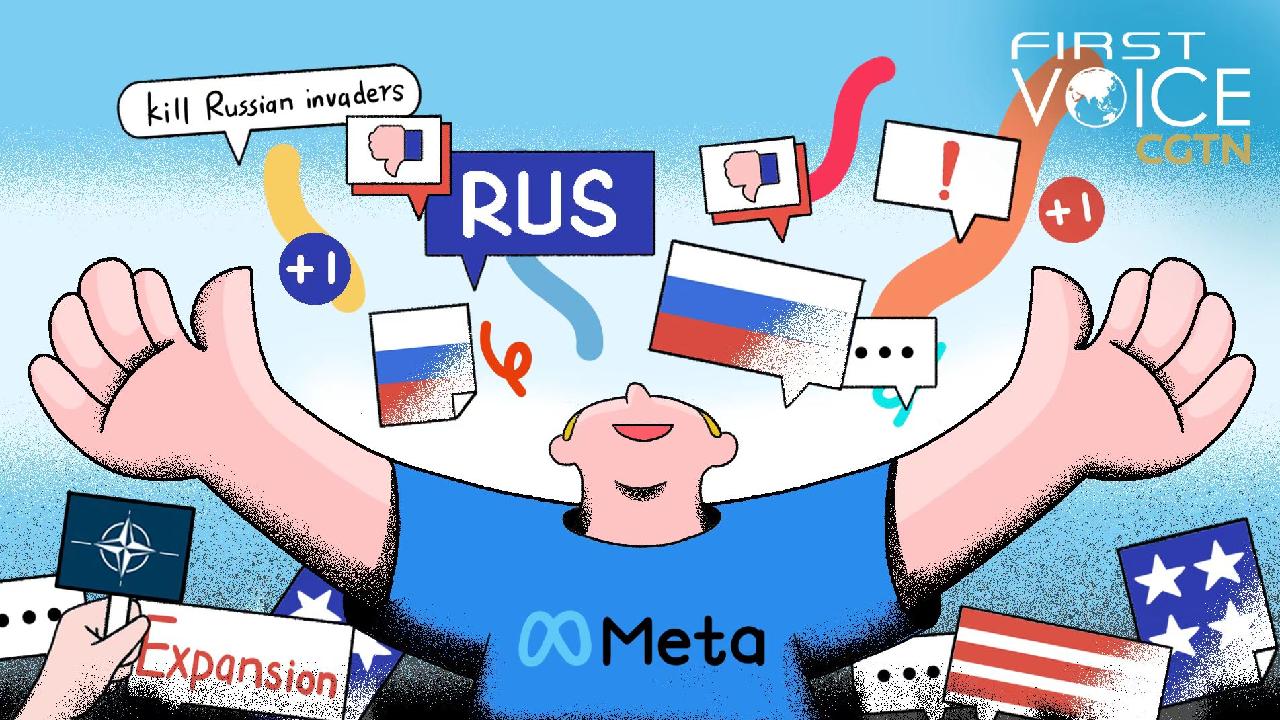Editor’s note: CGTN’s First Voice provides instant commentary on breaking news. The daily column clarifies emerging issues and better sets the news agenda, providing a Chinese perspective on the latest world events.
The hope is that social media companies don’t choose sides politically. But the reality is often very disappointing.
Meta, the company that owns Facebook and Instagram, recently emerged as an active participant in the global information wars by changing the rules of its hate policy to allow Facebook and Instagram users to call to “the death of the Russian invaders”. The company, which claims to be politically neutral, has a global presence, and its products on social media, as evidenced by various Color Revolutions, have the power to shape narratives that can bring regimes up and down. And the Russian government is taking action against the company by opening a criminal investigation.
Critics say Meta’s social media has fueled mass violence against minorities. For these reasons, Meta has implemented rules against incitement to violence. He even kicked former US President Donald Trump off his platform for violating his Community Standards regarding the storming of the US Capitol on January 6, 2021. That semblance of neutrality has now been shattered. In the midst of the Ukrainian conflict, Meta literally rewrites its rules to put an inch on the scale of Washington’s favorite narrative.
Modern warfare depends as much on controlling the narrative and winning the information battle as it does on other key elements like military and economic power. As we’ve seen in places like Iraq and Afghanistan, taking control of a country’s infrastructure through military force is pointless if you don’t win the hearts and minds of its people.

A deserted street on the second day of Russia’s special military operation in central Kyiv, Ukraine, February 24, 2022. /CFP
A deserted street on the second day of Russia’s special military operation in central Kyiv, Ukraine, February 24, 2022. /CFP
Ukraine is perhaps the most vivid example in our time of war stories in action. If you only read the Western media, you would see a lopsided, self-aggrandizing Vladimir Putin aiming to correct a mistake in history by restoring Ukraine to its rightful place within Russia, with the aim of joining the pantheon of national heroes such as Peter the Great. And according to this Western narrative, Putin does this by terrorizing civilians and committing war crimes.
If you read Russian media, you will understand that Russian troops are carrying out a special military operation to contain sympathetic Nazi nationalists who oppress the Russian-speaking population. According to this Russian account, nationalists use civilians as human shields and violate ceasefires to prevent people from fleeing. All civilian casualties are the result of nationalists using innocent people as cover.
It is very easy to see that people from another nation or culture have been duped, but somehow very difficult to imagine that you and the people you know have been influenced by the forces of misinformation. Events in Ukraine are unfolding in a sea of information of all kinds. And for people in some European countries, they have not been able to perceive the other side’s arguments because the EU has banned RT and Sputnik under the accusation of engaging in “continuous and concerted propaganda “. For English speakers, they claim that Russia only produces false propaganda, but do they recognize the disinformation campaign aimed at the country itself?
Just as we cannot accept as true or as is the things people say with whom we disagree, it is also important not to dismiss their ideas out of hand. It can close the doors to peaceful solutions and let situations that could have been managed spiral out of control.

Facebook unveils its new Meta panel at the company’s headquarters in Menlo Park, California, United States, October 28, 2021. /AP
Facebook unveils its new Meta panel at the company’s headquarters in Menlo Park, California, United States, October 28, 2021. /AP
Take for example the case of senior German naval officer Kay-Achim Schonbach, who resigned after saying that Putin’s concerns about NATO encroachment on Russia’s border areas should be taken seriously and that Putin “probably” deserved respect. Schonbach was shamed, shouted at and silenced. In retrospect, his insights contained valuable information, and a final peace agreement will likely need to incorporate some of the insights he offered.
The real harm of media and social media silencing opposing narratives like Schonbach’s is that groupthink can hurt those who need help the most. The solution to the Ukrainian crisis is not to “kill the Russian invaders”, as Meta seems to facilitate. The way to end the violence is to stop the fighting, start negotiations and find a lasting political solution in accordance with the principles of the UN Charter that respects national sovereignty and borders, and also has a balanced security mechanism that works for all stakeholders in Europe. , not just on one side.
Meta justifies its actions by saying that the conflicts in Ukraine have led the company to “temporarily allow forms of political expression that would normally violate our rules such as violent speech” while stressing that they will not allow “calls credible to violence against Russian civilians”. Violent speech is violent speech. Standard shouldn’t change as easily as Meta. Facebook doesn’t really have a compelling track record for discerning “credible appeals.” It would be hard to imagine Meta doing an outstanding job in the current climate.
Meta is a global company with unprecedented reach in human history. It has a greater responsibility than small businesses to contribute to world peace. By allowing the promotion of violence against Russians (civilian or otherwise) online, it further divides the people and the world, fanning the flames higher in the conflict. And that’s not what a responsible company should do.
(If you would like to contribute and have specific expertise, please contact us at opinions@cgtn.com. Follow @thouse_opinions Twitter for the latest comments in CGTN’s Opinion section.)

